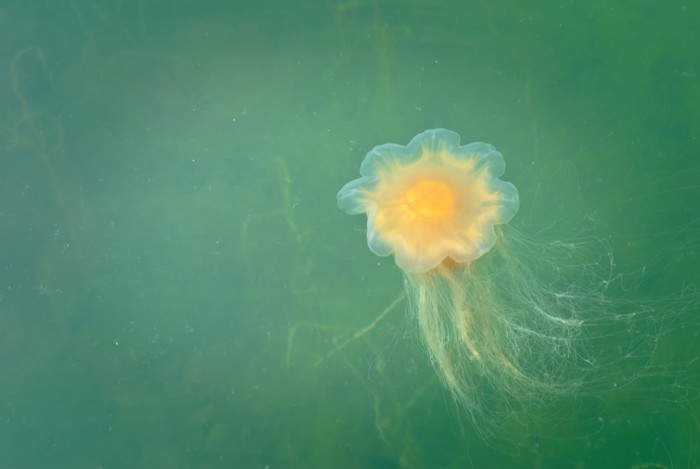The Lion's mane jellyfish contains a venom which consists of a mixture of substances. The venom is released from cells in the tentacles when they are stimulated either mechanically or chemically.
Symptoms
Symptoms of jellyfish stings in Norway can include:
- Immediate burning, localised pain
- Itching
- Skin irritation
- Red, swollen stripes which can develop into blisters or wounds
Other signs such as nausea, muscle pain, breathlessness, allergic or hypersensitivity reactions may occur, but are rarer.
In the event of injury to the eyes, severe pain can develop rapidly. Such injuries will require medical attention more often than injuries to the skin.
Treatment
Skin
- Rinse with seawater. Fresh water can increase the release of toxins and should not be used. Remove any tentacles. Do not rub with sand or similar, as this can also increase the release of toxins.
- Immerse the exposed area of skin in warm water in a shower or bath for 30-90 min, or until the pain subsides. 10-20 minutes is normally sufficient. The temperature of the water should be as hot as the patient can tolerate, up to 45oC.
- If the pain-relieving effect is poor, local anaesthetic ointments may be tried. Avoid applying ointment to large areas of skin.
- In the event of systemic reactions or persistent local reactions, symptomatic treatment may be appropriate.
Eyes
- Rinse thoroughly with lukewarm water. It can be a good idea to use physiological saline.
- Treatment by a doctor may be appropriate in the event of persistent symptoms.
- Treatment is symptomatic.
- In rare cases, it may be necessary to debride the cornea, as the nematocyst filaments can be left behind.
Lion’s mane jellyfish in other territorial waters
Many different species of jellyfish live in warmer waters which can cause severe symptoms after stinging. Life-threatening reactions can occur in the worst case scenario.
To avoid unpleasant encounters with the poisonous creatures of the sea, it is important to follow the advice of the local authorities when swimming.
